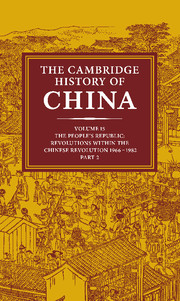Book contents
- Frontmatter
- 1 Mao Tse-tung's thought from 1949 to 1976
- PART I THE CULTURAL REVOLUTION: CHINA IN TURMOIL, 1966–1969
- 2 The Chinese state in crisis
- 3 China confronts the Soviet Union: warfare and diplomacy on China's Inner Asian frontiers
- PART II THE CULTURAL REVOLUTION: THE STRUGGLE FOR THE SUCCESSION, 1969–1982
- PART III THE CULTURAL REVOLUTION AND ITS AFTERMATH
- PART IV LIFE AND LETTERS UNDER COMMUNISM
- PART V THE SEPARATED PROVINCE
- Epilogue: the onus of unity
- Appendixes: meetings and leaders
- Bibliographical essays
- Bibliography
- Index
- Map 1: China’s physical features
- Map 2. PRC: political (Wade–Giles romanization)
- Map 3. PRC: political (pinyin romanization)
- Map 7: Population
- References
2 - The Chinese state in crisis
from PART I - THE CULTURAL REVOLUTION: CHINA IN TURMOIL, 1966–1969
Published online by Cambridge University Press: 28 March 2008
- Frontmatter
- 1 Mao Tse-tung's thought from 1949 to 1976
- PART I THE CULTURAL REVOLUTION: CHINA IN TURMOIL, 1966–1969
- 2 The Chinese state in crisis
- 3 China confronts the Soviet Union: warfare and diplomacy on China's Inner Asian frontiers
- PART II THE CULTURAL REVOLUTION: THE STRUGGLE FOR THE SUCCESSION, 1969–1982
- PART III THE CULTURAL REVOLUTION AND ITS AFTERMATH
- PART IV LIFE AND LETTERS UNDER COMMUNISM
- PART V THE SEPARATED PROVINCE
- Epilogue: the onus of unity
- Appendixes: meetings and leaders
- Bibliographical essays
- Bibliography
- Index
- Map 1: China’s physical features
- Map 2. PRC: political (Wade–Giles romanization)
- Map 3. PRC: political (pinyin romanization)
- Map 7: Population
- References
Summary
The Great Proletarian Cultural Revolution, which by official Chinese reckoning lasted from the beginning of 1966 to the death of Mao Tse-tung some ten years later, was one of the most extraordinary events of this century. The images of the Cultural Revolution remain vivid: the young Red Guards, in military uniform, filling the vast T'ien An Men Square in Peking, many weeping in rapture at the sight of their Great Helmsman standing atop the Gate of Heavenly Peace; veteran Communist officials, wearing dunce caps and placards defiling them as “monsters” and “freaks,” herded in the backs of open-bed trucks, and driven through the streets of major cities by youth only one-third their age; the wall posters, often many sheets of newsprint in size, filled with vitriolic condemnations of the “revisionist” or “counterrevolutionary” acts of senior leaders. The little red book carried by the Red Guards - a plastic-bound volume containing selected quotations from Chairman Mao - remains a symbol of the revolt of the young against adult authority.
From a purely narrative perspective, the Cultural Revolution can best be understood as a tragedy, for both the individual who launched it and the society that endured it. The movement was largely the result of the decisions of a single man, Mao Tse-tung. Mao's restless quest for revolutionary purity in a postrevolutionary age provided the motivation for the Cultural Revolution, his unique charismatic standing in the Chinese Communist movement gave him the resources to get it under way, and his populist faith in the value of mass mobilization lent the movement its form.
Keywords
- Type
- Chapter
- Information
- The Cambridge History of China , pp. 105 - 217Publisher: Cambridge University PressPrint publication year: 1991
References
- 3
- Cited by

